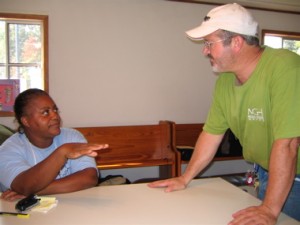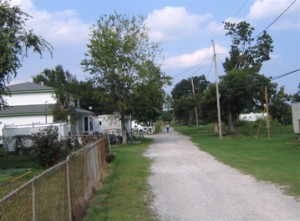By Stan Friedman
The decision to return to this community that was nearly destroyed by Hurricane Katrina was an easy one for 81-year-old Dorothy Stone (top photo).
“This is where I’ve always been,” says Stone, who has seen the community nearly destroyed by Hurricanes Flossie in 1956 and Betsy in 1965, only to be reborn after each storm. She returned to begin clearing debris from her property almost as soon as the waters from Katrina receded.
 The decisions have been easy to make for others as well. “I’ve been down here all my life,” says Louis B. Tinson, who worked as an oyster fisherman and served as the sheriff of Plaquemines Parish – where Phoenix is located – for 26 years. Tinson is treated each week for lymphoma in Baton Rouge, where he fled from the flood.
The decisions have been easy to make for others as well. “I’ve been down here all my life,” says Louis B. Tinson, who worked as an oyster fisherman and served as the sheriff of Plaquemines Parish – where Phoenix is located – for 26 years. Tinson is treated each week for lymphoma in Baton Rouge, where he fled from the flood.
On weekends, he returns to live in his FEMA trailer and mow the grass around his temporary home. “I went to Baton Rouge after Katrina, but it’s not like being home. I don’t know anybody in Baton Rouge.”
“It’s my home,” says Patricia Ann Thomas (center photo), who was one of the first to return and is a tireless leader in helping to rebuild.
The streets here are named after the generations of families that have continued to call Phoenix their home – there is a Thomas Lane and Tinson Lane. Located on what some refer to as the toe sticking out of the boot portion of Louisiana, this historically African-American community was founded in 1810 on land deemed by others to have no value.
Many of the settlers were former slaves, and since the town’s inception, the people have endured forces as deadly as the weather just to remain on their land. Like many, the grandfather of Tyronne Edwards was beaten on several occasions by whites who did not want him living here.
This is a place with a proud history as well as hope for a future that brings back residents who find strength in Nehemiah’s words, which now hang from a beam inside Zion Travelers Baptist Church. This is the place where Covenant World Relief (CWR) Director Jim Sundholm again encountered the prophet’s words and immediately knew they were to be the theme for Covenant World Relief this year. (To listen to Sundholm’s brief discourse on the subject of disgrace taken from the Nehemiah text, click on ![]() Jim Sundholm.mp3).
Jim Sundholm.mp3).
Community members living in FEMA trailers that dot the region recently met in the Baptist church with Sundholm and workers from Hillcrest Covenant Church of Prairie Village, Kansas, to discuss the rebuilding process. The church itself stood as a sign of hope. (To see additional photos of the reconstruction effort, please see two accompanying photo pages – A Community Rebuilds as well as A Church Reborn.
Water had topped off at 10 feet inside the church and left thousands of pounds of muck. Edwards, the preacher at Zion Traveler, says it was important for the community that the church meet as quickly as possible.
 On New Year’s Eve, the church held its first service in a tent on the levee, just across the two-lane highway from the homes. “We thanked God for our lives and what he was going to do,” recalls Edwards, who is determined to see the community rise again from the waters. “We used a volunteer fire department truck generator for lights.”
On New Year’s Eve, the church held its first service in a tent on the levee, just across the two-lane highway from the homes. “We thanked God for our lives and what he was going to do,” recalls Edwards, who is determined to see the community rise again from the waters. “We used a volunteer fire department truck generator for lights.”
Half a year later, when the church was cleaned and repaired enough that people could move back in, the congregation hosted a service attended by several black and white congregations that had lost their buildings, Edwards says.
With the help of CWR, the church replaced its floor, walls, ceiling and fixtures. A line across a speaker mounted at the top of the church is the only reminder of the physical damage that was done.
Residents whose homes were destroyed will have a choice of two or three-bedroom floor plans based on a 1,000-square-foot foundation, Sundholm says. He estimates materials will cost about $40,000 per home, adding that people will pay what they can toward the reconstruction cost.
Hillcrest already has sent work teams with a large trip planned for the Thanksgiving weekend. A mobile bunkhouse was recently delivered to the site so that volunteers will have a place to sleep. The modular unit has six bedrooms equipped with bunk beds and has a separate bath and entrance.
The church hopes to coordinate groups from around the country to work in Phoenix approximately every two weeks. Michael Gromer of Hillcrest Covenant Church led the rebuilding of 31 homes in Pascagoula, Mississippi, and now is guiding the work here. He says the church chose to help in Phoenix “because it seems to be where God is leading.” He says the words from Henry Blackaby’s book, Experiencing God, have been influential for the congregation: “Just find out what God is doing and adjust your life to get in on it.”
Benny Puckett, who leads Hands of Hope, a CWR partner in the region, say he hopes people will see that God is working in an area that continues to be neglected by others. “The hurricane cut right through the parish and cut a 40-mile swath like a 40-mile-wide tornado,” Puckett says. “These dignitaries, they fly in to New Orleans, but they don’t go to where the hurricane hit.”
 Awareness of the needs and response in Phoenix are scheduled to received a boost when retired CBS news anchor Dan Rather’s new cable channel program airs a special focus piece later this month. To learn more, see Focus on Phoenix.
Awareness of the needs and response in Phoenix are scheduled to received a boost when retired CBS news anchor Dan Rather’s new cable channel program airs a special focus piece later this month. To learn more, see Focus on Phoenix.
The people of Phoenix are working hard, however, to care for each other. Thomas is the program manager for Zion Travelers Cooperative Center, a non-profit organization the church formed last winter. She is zealous that life comes back to Phoenix.
Until recently, the cooperative distributed clothes, food and cleaning supplies. Thomas hopes the trailer that housed the distribution center will be transformed into a community center that will include a library and computers.
Thomas also has overseen a tool-lending library that was funded through CWR. The trailer includes power tools, mowers, ladders and tarps. Residents can check out the tools for up to three days. Anyone not bringing back the tools will have to deal with Thomas.
Thomas’s eyes widen with excitement as she tells about the day the modular buildings for the new school traveled down the highway. The trucks were stopped so that all of the children could have their pictures taken in front of the vehicles. “When those school buildings came – that was such a thrill that morning,” Thomas recalls.
The future represented by the children is every bit as important a reason for Thomas to continue her work as is honoring the past. She is adamant that the work be a witness.
“It’s a process, and it takes a lot of patience,” Thomas says.
Editor’s note: Covenant Communications staff writer Stan Friedman recently spent several days in Phoenix with Jim Sundholm, interviewing residents and taking photographs in preparation for this story. To learn more, see Rebuilding Phoenix.
